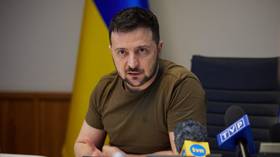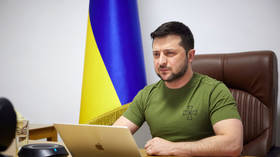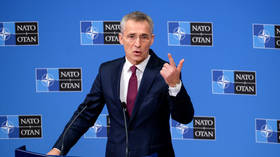Ukraine sets out how security guarantees could work

Ukrainian President Volodymyr Zelensky said on Friday that security guarantees for his country should empower guarantor countries to make a decision within a day. During the last in-person meeting between the Ukrainian and Russian negotiators in Istanbul, Kiev had propose an international agreement along such lines.
Speaking to Polish journalists amid the ongoing Russian offensive in Ukraine, Zelensky said that guarantors would need to make decisions within hours rather than days or weeks, as any delay in providing emergency military assistance would cost lives. The Ukrainian leader described this relationship between casualties and delays by saying “hours equals people.”
He explained that Ukraine now knows “what works on a battlefield and what doesn’t,” what should be done in various situations and what exactly is needed. Therefore, he explained, speedy decision making by Ukraine's guarantors would be a key factor.
“The ability to save a number of people depends on other numbers – terms, weapons ... I do not want to be very pragmatic .. But to tell you the truth: in terms of blood and casualties, hours mean people, so I believe that our security guarantees should be based on the formula 'people equals hours,'” Zelensky, who has previously blamed Kiev’s Western partners for being slow in providing help, told the reporters.
Zelensky explained that he is not insisting on NATO-style provisions.The president underlined that nobody knows how NATO would act if one of its members is attacked, as such a situation has never arisen and “God forbid that it arises.”
“So I'm not comparing. But I know for sure that we need security guarantees, and I know for sure what we need. We want to ask what we need, not what NATO can provide,” he said.
He explained that a security union he’d offered to create in March has a working title U-24 (Union-24) because it suggests that “the decision is made on the first day, not the second, not the third, but the first.” The guarantors should not “decide for ten days, send for four weeks, analyze for another eight weeks,” as speed is a key factor for saving lives, Zelensky stressed.He added that an agreement on security guarantees should make absolutely clear to a potential aggressor which measures would be taken in response to particular threats or actions.
On March 29, during the last in-person meeting between the Ukrainian and Russian negotiators in Istanbul, Kiev proposed penning an international agreement on security guarantees for Ukraine. These guarantees are named by the Ukrainians as a condition to agree to the neutral status that Russia insists on.
Earlier this month the president suggested that a peace agreement with Russia might consist of two separate documents that would cover the two key issues – security guarantees for Kiev and its future relations with Moscow. He explained that a document covering security guarantees could be signed by those countries “who are ready for these security guarantees,” while another document could cover future relations between Ukraine and Russia. Zelensky also revealed that the UK, US, Italy and Turkey have showed their readiness to provide security guarantees for Ukraine, but there has been no final answer from any of them.
As for now, the talks between Russia and Ukraine have stalled. Russian Foreign Minister Sergey Lavrov recently accused London and Washington of telling Kiev to backtrack on previously-reached agreements with Russia. Ukraine's new proposal, according to Lavrov, fails to mention that the security guarantees Kiev wants to obtain do not cover Crimea.
Russia sent its troops to Ukraine in late February, following Kiev's failure to implement the terms of the Minsk agreements, first signed in 2014, and Moscow's eventual recognition of the Donbass republics of Donetsk and Lugansk. The German- and French-brokered Minsk Protocol was designed to give the breakaway regions special status within the Ukrainian state.
The Kremlin has since demanded that Ukraine officially declare itself a neutral country that will never join NATO. Kiev insists the Russian offensive was completely unprovoked and has denied claims it was planning to retake the two republics by force.














